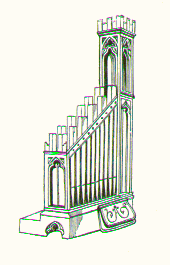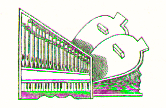INTRODUCTION * GRANTS * LAW + PROCEDURES * OTHER INFORMATION * LOCAL
| The organ is often the single most valuable item in
a church, and so it makes good sense to appraise its
capacities and qualities, and to seek an informed view
from time to time about its maintenance.
Independent advice becomes a necessity if major overhaul
seems due, or if moving, re-building or replacement of
the existing instrument is envisaged.
Useful general background guidance is provided in various publications: the Church Buildings Council [CBC, formerly the Council for the Care of Churches]'s booklet "Sounds good" (Church House Publishing, 2002), and its earlier pamphlet "Repair or Replace?" (1990, content now online). Dominic Gwynn's booklet "Historic Organ Conservation: a practical introduction to process and planning" (Church House Publishing, 2001), and The British Institute of Organ Studies' online Guidance webpages, are also useful sources. Nevertheless, the local circumstances are important; organs and their particular attributes are infinitely diverse. The Diocesan Advisory Committee therefore includes a specialist on organ matters, able to assess the worth, utility and condition of an instrument, and the appropriateness and value for money of proposals. As a first step in considering any work or
changes involving an organ (other than limited
work or tuning - see next paragraph), churches are
encouraged to contact and discuss matters with the
Diocesan Organs Adviser. The Adviser will normally
arrange to inspect the instrument and advise on a
possible course of action (or options) and procedures.
Early informal consideration and understanding is
mutually valuable, helping the client in preparing
suitable proposals, and the Diocesan
Advisory Committee consider them favourably
when those proposals are progressed. That way,
hopefully, the procedural pitfalls can be avoided as
well. It is in everyone's interest - not least because
there are "teeth" which could be brought to bear - to
be certain before commencing work that the church has
obtained the necessary Faculty or Archdeacon's written
authority, to be clear as to what if any conditions
apply, and then to abide by them (see
below). Organ builders as contractors are party
to these requirements. On 1st Jan.2016 the new simplified Faculty
Jurisdiction Rules 2015 came into force, which
includes significant changes, most notably the
introduction of two nationally applicable minor works
lists. Works on what is called List A can
usually be carried out without any diocesan consent,
subject to some standard conditions [this replaces
diocesan de minimis and minor works lists].
Works on a second List [B] can usually be carried out
without a Faculty, but do need the written consent of
the Archdeacon after informal consultation with the
DAC or one or more, often specialist, members.
All other works will still require a Faculty, although
that process has been simplified in As part of these new rules, a number of works have been added to the List A (where permission is not required). The following concern Musical instruments:
Also in List B (where archdeacon's consent is required):
Note: if intended work does not meet the criteria
for List A or List B then full Faculty is required. It is not always appreciated that organ blowing equipment and the electrical supply to the organ also require regular inspection and maintenance, which may indeed be a condition of fire insurance. For questions concerning an harmonium or
reed/American organ, you might find it useful to
consult the Cambridge
Reed
Organs website, or Phil Fluke at the Saltaire Reed Organ
Museum [e-mail].
Recent information pamphlets |
| The possibilities for obtaining grant support for
organs from heritage funding, national trusts, and local
sources, have varied in recent years, but do exist even
in times of economic austerity; for results one needs
effort, then patience. Grants are never given lightly,
are usually available only for genuine restoration work
(not alterations) to worthy organs, and often have some
strings attached. So it is important to approach the
right sources carefully and objectively, with
enthusiastic, well targeted, thoroughly thought out and
properly prepared plans and proposals, designed to stand
the best chance of meeting the grant giver's
criteria.
The British Institute of Organ Studies has prepared a useful leaflet: A Guide [to] Grants for funding work on historic pipe organs, which is available online as a .pdf file, to save and/or print off as required. The Institute of British Organ Building's leaflet: "Writing Organ Reports", produced in association with the Council for the Care of Churches) gives advice on best practice in the preparation and presentation of Organ Reports, which is particularly useful if it is intended to seek grant assistance for an organ scheme. This advice is also available online, or free by post from the Institute of British Organ Building [E-mail] (for full address see "other sources" below). The Diocesan Organs Adviser can provide preliminary advice as to the likely best grant source(s) and course of action. Please note however that the DOA is not in a position to provide a complete consultancy service, for which separate arrangements would need to be made. A consultant familiar with the requirements could plan and supervise the scheme from start to finish, obtaining and assessing estimates for the work, negotiating, justifying the right scheme to the grant source, and finally overseeing and controlling the quality of work in progress. The Association of Independent Organ Advisors maintains a list of accredited independent organ advisers able to assist those wishing to commission new organs or restore existing ones (contact details below). |

The law and procedures in relation to organs
| Changes to previous procedures first came about because
of the enactment of the Care of Churches and
Ecclesiastical Jurisdiction Measure 1991, intended in part
to address a need for consistency with current national
Listed Buildings and Conservation Areas legislation.
Ecclesiastical exemption from secular controls requires
that similar procedures to those which have long applied
in the Church of England as the established church, have
now been introduced for other denominations also - for
Roman Catholic, Methodist, Baptist and URC churches.
Nevertheless the future of "self- regulation" will always
remain under scrutiny, and it remains in the strategic
interest of these church organisations at all levels to be
seen to abide by the legislation if the privilege of
exemption (as it has been described) is to continue to be
seen to be deserved and available.
Churches need to show that they can exercise proper
care and control over the fabric and contents of their
buildings and churchyards. In the Church of England, the
Measure is applied through the authority of the Diocesan
Chancellor and Registry ie. its legal officers,
with sanctions through church courts. A published "Code
of Practice" to the Measure, useful but not particularly
light reading, is available from the Cathedral Bookshop.
The current advice from Church House on "How to manage
your Buildings" is here: A Diocesan Organs Adviser does not make the rules about the procedural requirements in relation to organs. He, with the Diocesan Advisory Committee for the Care of Churches to whom he is responsible, must try to apply them locally!
The Diocesan Office, Cuthbert House, Stonebridge, DURHAM DH1 3RY Tel: 01388 660001. |
| The Association
of Independent Organ Advisers maintains a
list of accredited independent organ advisers able to
assist those wishing to commission new organs or restore
existing ones. Contact: via website.
The Institute of British
Organbuilding is committed to promoting,
achieving and sustaining the highest standards in the
building and care of pipe organs, has introduced a
system of accreditation for organ-builders, has
published a series of useful
leaflets, and maintains a register
of
pipe organs surplus to their present requirements
and seeking a new home. The Church
Buildings Council [CBC] is a permanent
commission of the General Synod of the CofE which
seeks to educate, promote best practice and provide
guidance on all aspects of the care of churches and
their contents, overseeing and co-ordinating the work
of Diocesan Advisory Committees. The associated Churchcare
website provides valuable online advice and
guidance on care and maintenance of church contents,
including organs. Its Organs Advisory Committee
considers and publishes policy and advice on organs,
particularly historic instruments, for which grants
may be offered from funds provided by the Pilgrim
Trust and other charitable sources. |

| Durham Cathedral
organs: Booklet * Brief history * Father Smith * Stoplist * Recitals * The Organists The Cathedral Website (including forthcoming service music, and diary of events) Other organs in the Diocese: (pages and links being developed) * or if it is not, do please send details. |
|
Last updated 16 Feb.2020 . |